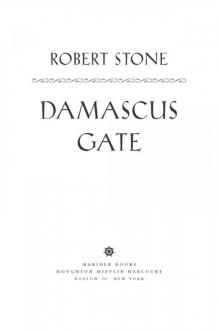Read Damascus Gate Storyline:
On the cusp of the millennium, Jerusalem has become a battleground in the race for redemption. American journalist Christopher Lucas is investigating religious fanatics when he discovers a plot to bomb the sacred Temple Mount. A violent confrontation in the Gaza Strip, a race through riot-filled streets, a cat-and-mouse game in an underground maze -- as Lucas follows his leads, he uncovers an attempt to seize political advantage that reveals duplicity and depravity on all sides of Jerusalem's sacred struggle. Ambitious, passionate, darkly comic, Damascus Gate is not only Robert Stone's biggest and best novel to date, but a timely and brilliant story of belief, power, salvation, and apocalypse.Amazon.com ReviewIn his earlier novels, Robert Stone has taken us to such hot spots as Vietnam, Central America, and that ultimate sinkhole of depravity we call Hollywood. This time around, it's Jerusalem. Given Stone's gift for depicting both political and personal embroilment--indeed, for making the two inextricable--this particular city is an inspired choice. For starters, Jerusalem remains a sacred destination for Muslims, Jews, and Christians and a hotly contested one. It's also a magnet for hustlers, fanatics, and millennial dreamers, a generous assortment of whom populate the pages of Damascus Gate. As always, Stone introduces a (relatively) innocent American into the picture--a journalist named Christopher Lucas. This career skeptic prides himself on his detachment: he prefers the kind of story "that exposed depravity and duplicity on both sides of supposedly uncompromising sacred struggles. He found such stories reassuring, an affirmation of the universal human spirit." Yet Lucas, a lapsed Catholic, has journeyed to Jerusalem at least in part to recharge his devotional batteries. And as he's slowly drawn into a terrorist plot--which involves drugs, arms smuggling, and a plan to blow up the Temple Mount--Lucas sheds his detachment in a hurry. Stone's novel functions as an expert thriller, whose slow, somewhat clunky wind-up is more than compensated for by a brilliant grand finale. It is also, however, a dogged exploration of faith, in which cynics and true believers jostle for predominance. "Life was so self-conscious in Jerusalem," the author reflects, "so lived at close quarters, by competing moralizers. Every little blessing demanded immediate record." It's hard to imagine a more vivid record of these mutual blessings--and maledictions!--than Robert Stone's. From Publishers WeeklyFrom its sublime triumphs to its noble failures, Stone's first novel since Outerbridge Reach (1993) is a major work in every aspect, a sprawling, discordant prose symphony. In Jerusalem, which he depicts as a holy Bedlam, Stone finds the perfect setting for the spiritual agonies that have marked his most powerful writing. In that city, everyone suffers from the burden of faith, or lack of it, and everyone wants something, usually at any price. Expat American journalist Christopher Lucas wants a surer identity?born Christian and Jewish, he feels rooted to neither faith?as well as love and, of course, a good story. But his desire has limits, drawn by conscience, and so he serves well as the reader's proxy, a normal man surrounded by seekers of the absolute. Around Lucas swirl addled saints, addicted sinners, con men, cruel members of Hamas and even crueler Israeli security forces. All the parties have their own agendas, most of which hinge on a conspiracy among extremist Israeli Jews and American Christians to blow up the Temple Mount and usher in Armageddon. Stone's presentation of this narrative backbone can be mechanical and sometimes seems extraneous to the novel's main theme of the wages of faith. More captivating is an ancillary plot involving a drug-blasted seeker's attempts to elevate a manic-depressive Jew as a world savior; one of his pawns, Sonia Barnes, an American Sufi who's also Lucas's love interest, proves as compelling as any Stone heroine. Most extraordinary, though, is the author's passionate etching of landscapes both physical and spiritual. The book opens slowly, with a diffuse if portentous ramble through the city, though the narrative intensifies through scenes of terror and moral gravity?particularly in a nightmare Gaza strip inflamed by riot?until Jerusalem and its people coalesce to iridescent indelibility. Bold and bracing, ambitious and inspired, Damascus Gate is, even for its flaws, an astonishment. 100,000 first printing; $150,000 ad/promo. Copyright 1998 Reed Business Information, Inc.Pages of Damascus Gate :
